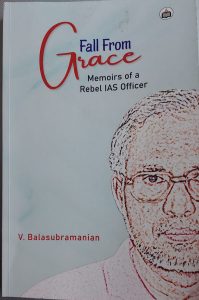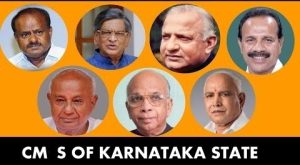- ASHA KRISHNASWAMY, SENIOR JOURNALIST.
Bengaluru : What ideology is at work in the elections of Karnataka? The one and only philosophy is caste and cash. Unlike in other South Indian states, Karnataka elections are caste and community dominated.
The only leader who tried to break the Lingayat-Okkaliga udu-grip was Devaraj Urs, who brought the backward classes to political power. But after him, the historical pattern of caste domination and obscurantist normalcy has resumed.
These are the frank opinions expressed by V Balasubramanian, a retired IAS officer, in his book, Fall From Grace – Memoirs of a Rebel IAS Officer. It is going to be launched on July 30.

The book reflects the observations and experience of Balasubramanian, who retired from the service in 2001. He minces no words while hitting out at politicians as well as some of his one-time colleagues. While he has named some officers, he has avoided others. But he doesn’t sound bitter or cynical because he is also liberal in complimenting certain politicians and officers.
He writes that the tragedy of Karnataka’s mock-democracy is that every time the government misrules, the people vote out the ruling crook party and elect another crook party in the next elections. In a vicious circle of helpless democracy, the previous crook party is elected again after its misrule. In this fake democracy, no party gets a majority of seats. No matter, resort can be taken to “resort democracy”—a patented Karnataka invention which all democratic and constitutional institutions, including the judiciary, and all “intellectuals” have come to accept as the new norm, the author points out.
He attributes the beginnings of’resort’ politics to Ramakrishna Hegde.He was the one who rescued NTR, whose Telugu Desam MLAs were brought to the Dasparakash Hotel in Mysore. Hegde’s much publicised value-based politics was more of a politics-based value, he says sarcastically.
SM Krishna’s ham-handed style of administration, which he flattered himself as modern, totally misfired, and it was Deve Gowda and BS Yediyurappa who consolidated their caste votes. The SC/STs and other minorities became the NPA (non-performing asset) of Congress. In Karnataka, the Congress itself has become its own nuisance, and the BJP did not require SMK’s nuisance-value defection. He was already a dead-duck, a spent force and a disaster. In the 2018 assembly elections, the JD (S) swept all the seats in SMK’s Mandya, he points out.

Lashing out at the style of functioning of SMK, whom he refers to sarcastically as the Fulbright Scholar, Balasubramanian says his lacklustre administration was in shambles with Dr Rajkumar kidnapped by Veerappan. He made it worse by appointing a junior officer as chief secretary at the expense of a good and honest Mysorean. The reason? He was a Brahmin sans any political clout.
The retired bureaucrat categorically says Karnataka’s administration in the past five decades is a great fall from grace. “I have worked in the regimes of Veerendra Patil and Sidddaramaiah. There is a clear fall in standards. Urs and Veerendra Patil were the only two who behaved politely with the officers,” he says.
The author says after the ethical tenures of chief secretaries RJ Rebello, GVK Rao, RA Naik, TR Satishchandran, and JC Lynn, others acted more like chief clerks, carrying out illegal orders of the CMs. They permitted the ‘second slae’ in liquor, promoted corruption as in the Classik Computer case, denotification of BDA land acquisitions after taking possession of lands, allowing grabbing of lakes and public lands, regularising illegal occupation and construction, kidnapping MLAs as hostages and keeping them in resorts, changing parties like chameleons-the race to the bottom has been supersonic with the ‘neutral’ higher bureaucracy being mute spectators and even participants, he says. PWD, the epitome of corruption
Balasubramanian writes that SMK had set aside Rs 100 crore for the construction of Vikasa Soudha even before the project was conceived. As Additional Chief Secretary, he had advised SMK not to proceed with the construction of Vikasa Soudha, which now stands as a “calf” next to a “cow”.
The retired officer says among all the departments, the PWD tops the list of corruption. The department has a peculiar rule for the bidding of any work being open to only those who are “registered” with it. The world’s most competitive construction companies do not even know about Karnataka’s projects. The corruption in government contracts arises because of a failure to follow the best practises that are commonly accepted all over the world.
Nepotism and incompetent‘registered crony-benami-firms and relatives of bureaucrats and politicians getting the contract. SMK and Dharam Singh had set aside all the best practises by going to a registered contractor for the Vikasa Soudha. Setting aside L & T, a Pune-based firm was selected. The lowest tender of Rs 76 crore was by L & T. The higher tender was from a Pune-based firm. The government negotiated with the Pune firm, made it reduce the cost, and later handed over the project. Finally, the project was delayed and the cost touched Rs 150 cr.
Much later, the monstrous Rs 500 cr Suvarna Vidhana Soudha in Belgaum was constructed in 2012 and the contractor was the same Pune firm. The original estimate was for Rs 230 cr. The engineered delay for two years pushed up the cost. No external quality check, no publicly-tendered agency prepared detailed project report (DPR) for a building which could be used for a month in a year. The specious excuse given was that the dangerous claim by Maharashtra that Belgaum belongs to it would be effectively repudiated by a great building!
Corruption is everywhere!
Corruption in political leaders is only a matter of degree. The three major sources of funding for politicians are: Traditionally, it used to be excise contractors. Later, the irrigation contractors became the sources, with mega irrigation projects coming up. Finally, illegal land allotments and encroachments, which began in the 1980s,

He traces the gentlemanly state of 10% mamool to Karnataka, which has made a great leap forward in the last 50 years, to 40%. There should be some decency in bribing. But the big jump is nothing compared to the incomparable Bihar, where in April 2022, an entire 500-tonne bridge was stolen away in three days. Karnataka still has a long way to go, but it is catching up, Balasubramanian writes.
When Devaraj Urs’s body was taken in procession to Kallahalli, covering a distance of 185 kms, people standing on the roadside clapped spontaneously. This was in appreciation of his work. He wonders if any leader can get such a farewell now!









